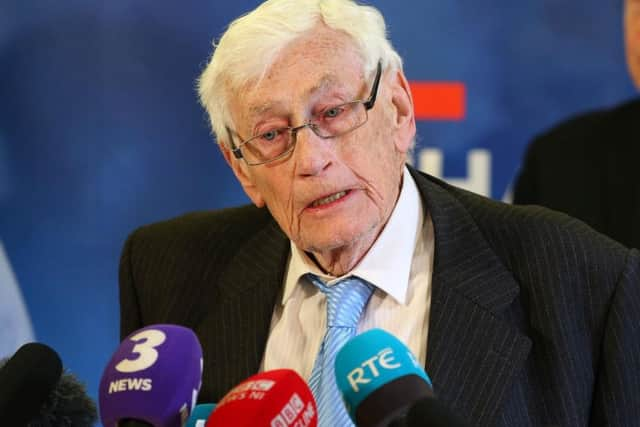Ben Lowry: A huge missed opportunity to challenge SF in West Tyrone


The trigger for the by-election, to be held on Thursday week, was the ‘joke’ by Barry McElduff about the massacre of Protestants at Kingsmill.
That 1976 atrocity was perhaps the most overt of the sectarian IRA atrocities, even when you consider the slaughter of civilians at Enniskillen and La Mon and Teebane (all of which, if carried out by Serbs against another ethnic group in the Balkans, would have led to a determined effort to bring a criminal case before an international court against the leaders of the group responsible).
Advertisement
Hide AdAdvertisement
Hide AdBut it is not as if the overall republican terrorist campaign was anything other than sectarian.


On the 20th anniversary of the Belfast Agreement, the staunchly nationalist Seamus Mallon spoke movingly on BBC Talkback about the destruction caused by violence on all sides, including the murder of Protestant farmers, and he dismissed the idea that such killings were an attack on the British ‘war machine’.
West Tyrone was an almost unique chance to underline the hypocrisy of, and embarrass, a party that is allowed to bring devolution to a halt by demanding ‘respect, integrity and equality’ of others, while brimming with disrespect for the sensitivities of the other community.
There is next to no chance of another party defeating Sinn Fein in that seat if the contest involves multiple candidates, as it now will. Even a single victims’ candidate would have struggled to beat SF in a constituency such as West Tyrone.
Advertisement
Hide AdAdvertisement
Hide AdBut it is possible that one such candidate might have run them close, perhaps 52% to 48%, and caused deep discomfort in their heartland.


Ideally such a candidate would have been a victim, and perhaps from a Catholic background.
While the over-arching republican campaign was sectarian, woe betide any Irish Catholic deemed to have stood in its way, such as working in certain roles for the British state. Hundreds of Catholics were murdered. Do not forget the vicious targeting of Catholic judges.
I asked a unionist politician yesterday about the failure to get a victims’ candidate in West Tyrone, who said it was due to the lack of success in identifying such a person.
It did not seem to me like there was much effort to do so.
Advertisement
Hide AdAdvertisement
Hide AdIn any event, it would have been essential that such a candidate was seen as largely apolitical, except insofar as being driven by a determination to challenge Sinn Fein glorification of past killers.
This would have raised difficulties, such as the position that such a candidate would, if elected, take in Westminster on Brexit votes. But I would argue that, from a Northern Irish perspective, even the huge post-EU debate takes second place to the crisis we face with the growing glorification of violence by a party that has to be in government at all times.
Most commentary since early 2017 on the Stormont stalemate has concentrated on what it will take to woo Sinn Fein back into power. But in a sane democratic situation the rest of the political spectrum would unite against people who celebrate terror.
It would have been difficult, perhaps politically impossible, for the SDLP to opt out of a by-election in an overwhelmingly nationalist constituency but not for Alliance to do so.
Advertisement
Hide AdAdvertisement
Hide AdTwo of the most scathing comment pieces this newspaper has run in the last year about the IRA were written by Dr Philip McGarry and John Cushnahan, both of that party.
In 1992, Alliance stepped aside in West Belfast to help Joe Hendron defeat Gerry Adams – a seminal moment in Northern Ireland politics, and one which some observers say hastened the IRA ceasefire of 1994.
Thinking back on sectarian terror prompts me to add some thoughts on the debate about unionists staying or leaving a united Ireland.
There has been interesting comment from pro-union voices, since Arlene Foster told Patrick Kielty she might leave in that scenario, including from Sir Jeffrey Donaldson MP, Robin Swann MLA and Christopher Stalford MLA (who would stay) and Owen Polley, on these pages yesterday (who would be inclined to leave).
Advertisement
Hide AdAdvertisement
Hide AdOne thing to bear in mind is the joy that a Protestant exodus would bring to those who supported the murder of isolated members of that community during the Troubles.
Republicans love to quote Bobby Sands: ‘Our revenge will be the laughter of our children.’
Well the revenge of those vulnerable pockets of an ethnic group is that they are still largely there, despite the effort to drive them out.
• Ben Lowry (@BenLowry2) is News Letter deputy editor